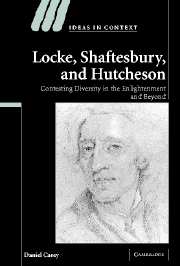Crossref Citations
This Book has been
cited by the following publications. This list is generated based on data provided by Crossref.
Buchan, Bruce
2007.
Traffick of Empire: Trade, Treaty andTerra Nulliusin Australia and North America, 1750–1800.
History Compass,
Vol. 5,
Issue. 2,
p.
386.
Hale, Matthew
Hawkins, Richard
and
Wright, Catherine
2007.
List of publications on the economic and social history of Great Britain and Ireland published in 2006.
The Economic History Review,
Vol. 60,
Issue. 4,
p.
773.
2008.
Books received.
The British Journal for the History of Science,
Vol. 41,
Issue. 4,
p.
631.
Hamlin, William M.
2010.
Florio's Montaigne and the Tyranny of “Custome”: Appropriation, Ideology, and Early English Readership of theEssayes*.
Renaissance Quarterly,
Vol. 63,
Issue. 2,
p.
491.
Gill, Michael B.
2010.
From Cambridge Platonism to Scottish Sentimentalism.
Journal of Scottish Philosophy,
Vol. 8,
Issue. 1,
p.
13.
TURNER, JACK
2011.
JOHN LOCKE, CHRISTIAN MISSION, AND COLONIAL AMERICA.
Modern Intellectual History,
Vol. 8,
Issue. 2,
p.
267.
Sebastiani, Silvia
2011.
Character, Self, and Sociability in the Scottish Enlightenment.
p.
187.
Carey, Daniel
2011.
Studies in Settler Colonialism.
p.
28.
Delbourgo, James
2012.
The Newtonian slave body: Racial enlightenment in the Atlantic World.
Atlantic Studies,
Vol. 9,
Issue. 2,
p.
185.
Holtz, Grégoire
and
Masse, Vincent
2012.
Étudier les récits de voyage.
Arborescences,
Rogers, Shef
2013.
Jonathan Swift and the Eighteenth-Century Book.
p.
135.
Sebastiani, Silvia
2013.
The Scottish Enlightenment.
p.
23.
Sebastiani, Silvia
2013.
The Scottish Enlightenment.
p.
133.
Collier, Mark
2013.
The Humean Approach to Moral Diversity.
Journal of Scottish Philosophy,
Vol. 11,
Issue. 1,
p.
41.
Kail, Peter J. E.
2013.
Scepticism in the Eighteenth Century: Enlightenment, Lumières, Aufklärung.
p.
95.
Wolfe, Charles T.
2014.
Motion and Knowledge in the Changing Early Modern World.
Vol. 30,
Issue. ,
p.
141.
Knott, Martin Otero
2014.
Mandeville on Governability.
Journal of Scottish Philosophy,
Vol. 12,
Issue. 1,
p.
19.
Müller-Wille, Staffan
2014.
The Cultural Politics of Blood, 1500–1900.
p.
191.
2014.
Sovereignty, Property and Empire, 1500–2000.
p.
125.
Klein, Lawrence E.
2015.
The Encyclopedia of British Literature 1660‐1789.
p.
1118.





